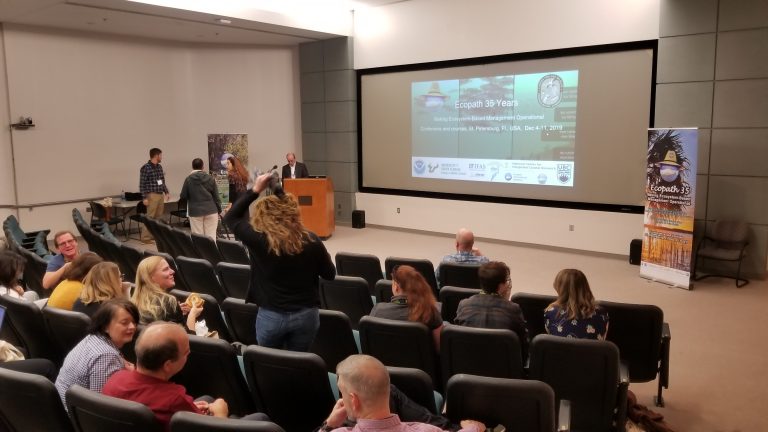Written By: Dr. Cameron Ainsworth, Associate Professor
ST. PETERSBURG, FL – The USF College of Marine Science hosted a series of events in December to help advance ecosystem science and ecosystem-based fisheries management.
“I am pleased that the College of Marine Science had this opportunity to support marine ecosystem science”, said Dr. Cameron Ainsworth. “This work is critical as we forge ahead to better understand how human activities and climate influence marine communities.”
The Ecopath35 conference held Dec 4-6 drew attendance from 110 scientists and students from 25 countries. The conference celebrated the 35th anniversary of the “Ecopath with Ecosim” software suite for ecosystem and food-web modeling. A highlight was the keynote address by Dr. Robert Ulanowicz of the University of Maryland and the University of Florida. His work on system self-organization is a cornerstone of theoretical ecology.

The Ecopath35 conference is opened by Dr. Villy Christensen from the University of British Columbia.
There were 38 talks and 52 posters presented on the conference theme of making Ecosystem-Based Management operational. An additional 5 days of workshops offered participants training on topics from model development to the latest add-ons available from the world community of modelers. Generous support was provided by the National Oceanic and Atmospheric Administration (NOAA), the Florida Wildlife Commission and the College of Marine Science at the University of South Florida.
The Fifth National Workshop on Ecosystem Modeling (NEMoW 5) followed and was held Dec 9-11. This biannual NOAA event brings together ecosystem modelers working in federal fisheries management programs. As the College of Marine Science played host, our students had the rare opportunity to interact with the principal movers and advocates of ecosystem-based fisheries management in the country and from each of NOAA’s five national management regions.
The week concluded with NOAA’s Southeast Regional Ecosystem Modeling Strategic Planning workshop on Dec 11 and 12. This function brought together experts from each of NOAA’s five Southeast laboratories, as well as State and academic partners to discuss the long-term strategy of supporting ecosystem-based fisheries management in the Gulf of Mexico. Discussions focused on integrating modeling efforts, identifying data gaps, and providing the Gulf of Mexico Fisheries Management Council with ecosystem science to complement fisheries stock assessments.
